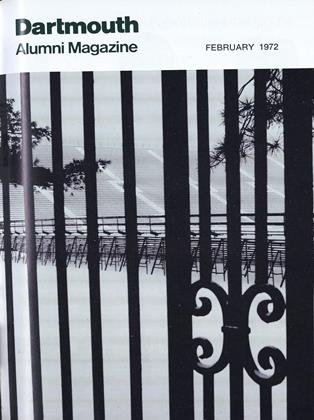By RichardE. Welch Jr. '45. Cambridge: HarvardUniversity Press, 1971. 364 pp. $14.
George Frisbie Hoar's political career was in many ways synonymous with the birth and development of the Republican party. His contemporaries on the ends of a half century of political service illustrate well this fact: Charles Sumner, John Andrew, and Abraham Lincoln on the one hand, and Henry Cabot Lodge, Mark Hanna, and Theodore Roosevelt on the other.
Mr. Welch warns us not to read George Hoar's career only in this manner: the anachronistic Free-Soiler in the United States Senate of Matt Quay, the Worcester attorney from the era of Webster in the Senate chamber in the age of Morgan. Yet the temptation cannot be resisted entirely. Surely the old- Conscience Whig, who discovered near the end of his career—to his chagrin, we may be certain-that it was necessary in Senate speeches to translate Greek and Latin epigrams, gives at least a nostalgic prod to our sense that things had changed. Yet Mr. Welch's point is that despite these changes George Frisbie Hoar remained as solid and consistent as the Yankee tradition which he personified. "George Frisbie Hoar spent his entire adult life in an effort to be true to his God, his party, and his ancestors. He died convinced that he had done his best by each, and probably he had."
It is difficult to categorize George Hoar: an abolitionist, an advocate of women's suffrage, an often strong defender of the freedman and the immigrant, an articulate opponent of imperialism. But he was also uneasy about labor "radicalism" (read, in the economic orthodoxy of his time, as effective organization), a continuing proponent of the protective tariff, and a foe of the income tax. Welch advises us that it was on moral rather than economic issues that Hoar's "liberalism was most certain." But the distinction between the two categories is not always clear. When party loyalty and conscience were in conflict, Hoar tried to be loyal to each—and thus on occasion reduced his effectiveness as both partisan and moralist. After playing a role in the destruction of the Whig party, Hoar was forever after a loyal partisan. He rejected Liberal Republicanism, Mugwumpery, and organized anti-imperialism when his moral sense might have led him in these directions.
It is tempting to extrapolate from Hoar's record a typical career of political expedience, of convictions tempered by public cowardice. But one should avoid this temptation. His attacks on the American Protective Association were in the face of that organization's virtual control of the Massachusetts Republican party. His open friendship for Filipino guerilla leader Emilio Aguinaldo and his publication of U.S. Army atrocities, not unlike our own My Lai, came in the face of a super-patriotic public sentiment.
George Hoar was a complex man. Mr. Welch helps us to understand many of these complexities. Perhaps we would like to know more of the man. The book is not biographical in that Hoar's personal and family life is ignored. We know nothing of either of his wives, for example. The book is a political biography, and a good one. The product of a great deal of research, it is presented ably.
Dartmouth Assistant Professor of History,Mr. Wright teaches courses in nineteenthand twentieth century American History andthe History of the American West.
 View Full Issue
View Full Issue
More From This Issue
-
 Feature
FeatureEDITING ROBERT FROST
February 1972 By EDWARD CONNERY LATHEM '51 -
 Feature
FeatureThe Growing Threat to Privacy Posed by Computer Data Banks
February 1972 By ROBERT P. HENDERSON '53 -
 Feature
FeatureTrustees Meet with Alumni Council
February 1972 -
 Feature
FeatureSymphony Conductor
February 1972 -
 Feature
FeatureExecutive Exporter
February 1972 -
 Feature
FeatureSnow Engineer
February 1972
JAMES E. WRIGHT
Books
-
 Books
BooksTHE LUSTY TEXANS OF DALLAS
March 1951 By ALLEN R. FOLEY '20 -
 Books
BooksRights and Wrongs
JANUARY/FEBRUARY 1984 By Charles M. Culver, M.D. -
 Books
BooksFrom the Ground Up
APRIL • 1985 By Courtney C. Brown '26 -
 Books
BooksMEET DOCTOR DOLITTLE.
JANUARY 1968 By ELNA KUHLMANN -
 Books
BooksMASTER OF THE COURTS.
May 1974 By JOHN HURD'21 -
 Books
BooksPRACTICAL HANDBOOK OF INDUSTRIAL TRAFFIC MANAGEMENT
July 1953 By KARL A. HILL '38



